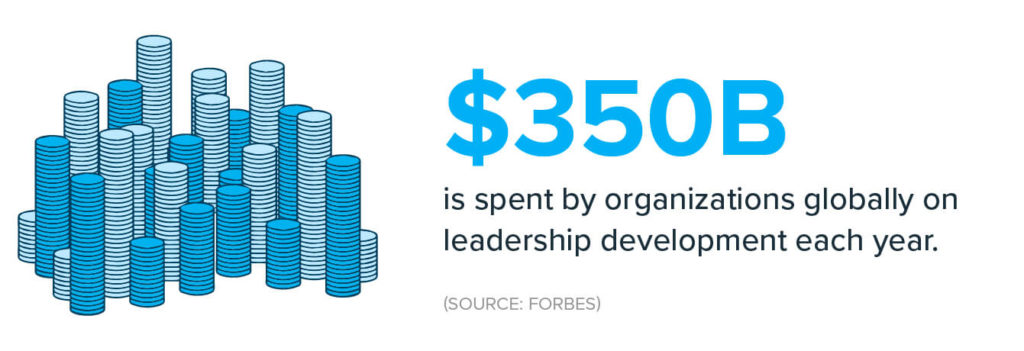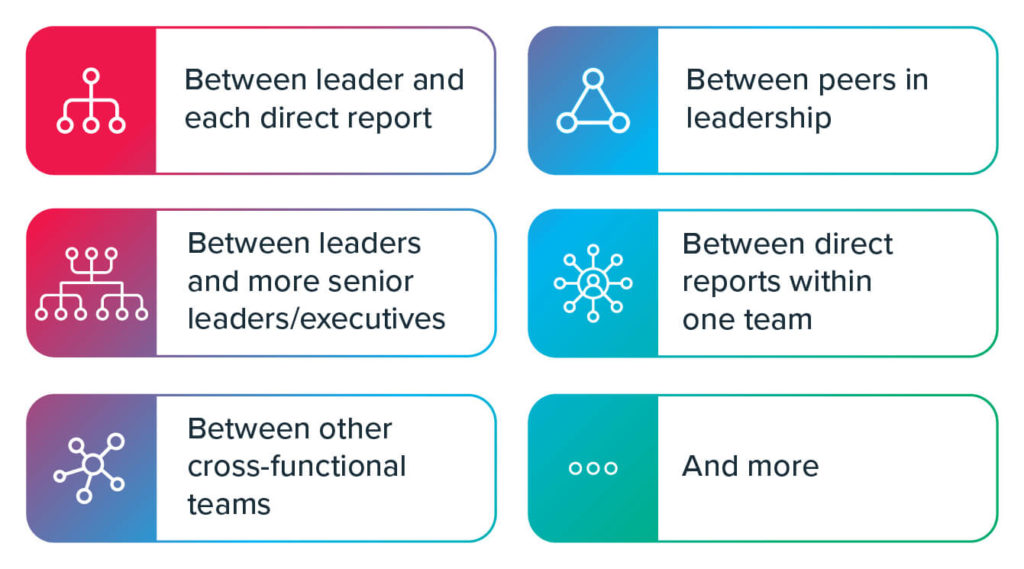
Organizations spend $350 billion on leadership development globally each year. This investment usually includes one of the many personality assessments on the market, and leaders get insights into their strengths and gain more self-awareness about their tendencies.
Despite that hefty investment, the learning rarely sticks — and leaders’ behavior rarely changes. That’s because most assessment products are one-dimensional: they’re based on self-measurement, meaning the insights are focused on just that individual. While this self-awareness is a critical, foundational building block for leadership development, it’s not enough on its own.
People come back from such workshops feeling overwhelmed and behind on work, without the reinforcement tools to help them remember what they learned and practice their new skills at work. Soon, they slip back into old habits.
When you focus on developing the leader but stop short of helping them understand how to interact with the people they lead, leadership development programs will never reach their full potential — and personality conflicts in the workplace will continue to erode team trust, commitment, and results.
Leadership is a relationship
Without people who follow, there is no leader. To generate and sustain trust, commitment, and results, a leader must become devoted to understanding the complexities of all the relationships in their workplace:

That’s a lot of relationships, and they move up, down, and across the org chart. Each individual is complex and different, and those differences shape every relationship. Leadership development should support leaders and their teams with multidimensional assessments that increase self-awareness, yes, but go further and deliver actionable, team insights that strengthen relationships.
What is a multidimensional assessment?
Let’s take a deeper look at some of the terms we are using here. One-dimensional is defined as “having or relating to a single dimension” and a one-dimensional assessment relates to a single individual. My own one-dimensional assessment results can tell me a lot about me. If you were to share your one-dimensional assessment results, they could tell me a lot about you. The problem is that those one-dimensional insights don’t tell me about us together. I need insights about how our personalities interact to unlock the power of the assessment and apply it in my day-to-day work.
Multidimensional is defined as “involving several dimensions or aspects.” A multidimensional assessment takes all the insights about you and the people in your orbit and gives you practical tips on how to adjust your approach in future interactions to improve work relationships.
A personality assessment should deliver more value than just telling you what — let’s be honest — you probably already know about yourself. One of the reasons it’s so satisfying to take most assessments is that you feel very seen by the results.
Your reaction might be, “This makes so much sense!” or “Now I have the language to talk about my tendency to… (fill in the blank).” Because of this, some people use one-dimensional personality assessments as justification to become even more entrenched in their ways.
Multidimensional assessments support personal growth, empathy, understanding, better communication, trust, commitment, and results. To determine whether or not an assessment meets the requirements to be multidimensional, look for these three factors, akin to three rings of a tree:
Self-awareness insights
Self-awareness is the core of any good assessment — and the core skill of great leadership. When you understand your own strengths, values, and motivations, and have the language to talk about them, you understand why you do what you do, why you care about what you care about. If there are certain areas where you want to develop or behavior changes you want to make, those adjustments begin with self-awareness.
A good self-awareness assessment should help you understand that the environment has a major impact on what motivates you and how productive you can be. The assessment should give you insight into the different manifestations of your personality under two different conditions: when things are going well and when there’s conflict.
The assessment should also illustrate how strengths can be used productively or overdone. Well-intended strengths, when overdone, can limit our effectiveness. For example, it’s great to be supportive of others. That’s a strength. But we all know people who are so supportive of others that they don’t take care of themselves. Too much of a strength is simply not a strength when it causes harm to oneself or others.
Team relationship insights
Multidimensional assessments give you insights into the motives, strengths, and values of those you lead, report to, and work with. This insight helps to build trust and empathy, because the assessment makes people’s invisible differences external — visible in the results of the assessment.
With only self-awareness insights, a results-oriented person who knows themselves well might have been annoyed with their colleague who deliberates over every decision. With team relationship insights, they can see that the colleague cares deeply about the process, and that their strengths contribute value to the shared goal.
A good multidimensional assessment will also give you insights into how the team works differently together when things are going well and when there’s conflict, and it will help each team member understand each other’s productive and overdone strengths.
In-the-moment insights
In-the-moment insights are the outer ring: they give leaders and their teams insights for adjusting their approach and making interactions with each other more effective. This step takes team relationship insights and distills them into bite-sized, actionable tips. It recommends behavior changes that will build trust, generate commitment, and drive results through relationships. It helps people recognize shifts in conflict in real time and adjust their behavior to recapture productivity and good will.
You may be wondering how that’s possible, when every human is so complex, and there are so many relationships in the workplace. But you don’t have to memorize every detail about the inner workings of every person you know.
Well-designed tools for Microsoft Outlook, Microsoft Teams, Zoom, and Slack keep track of all this information for you, and put helpful reminders at your fingertips before important interactions. That way, everything from a high-stakes meeting to a casual online chat becomes an opportunity to prevent conflict and strengthen relationships.
The Core Strengths assessment takes you deeper
Core Strengths goes beyond self-awareness insights and delivers real value to leaders with our multidimensional personality assessment and its associated digital development tools.
By cracking the code of people’s different values and communication styles, the Core Strengths assessment helps teams more clearly see the positive intentions behind one another’s actions — making relationship dynamics easier to navigate (what we call Relationship Intelligence at Core Strengths).
Typically, you would need expensive, one-on-one coaching and a deep time investment to be able to improve interactions with the complex web of complex people you work with. But Core Strengths surrounds its assessment with digital products that serve you bite-sized advice in the moments that matter most: right before a meeting, while you’re writing an email, and beyond.
Gain deeper insight into yourself and your colleagues, then put that insight into action every single day to become a transformational leader.
- Learn more about our assessment.
- Learn more about our training programs.
- Learn more about our digital platform.
- Learn more about our add-ons to your communication tools.







